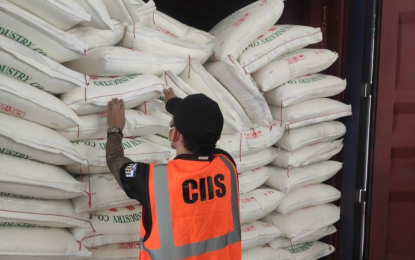
File photo
MANILA – The national government is carrying out a “vertical integration” strategy to address the issues in the agriculture sector such as hoarding and smuggling of commodities, President Ferdinand R. Marcos Jr. said on Tuesday.
In a media interview on the sidelines of the Department of Agriculture’s (DA) 125th founding anniversary in Quezon City, Marcos said the implementation of vertical integration is seen to boost agricultural production and stabilize commodity prices.
“There’s a very simple concept na tinatawag na (called) vertical integration. Imbes na isang kumpanya may ginagawa, isa naging trader, isa naging marketing, isa retail. Pagka iba-iba ‘yan, maraming cost ‘yan paglipat. ‘Pag vertically integrated ‘yan, ‘pag kasama lahat ‘yan, wala ng cost ‘yun, tuloy-tuloy na lang hanggang sa retail (Instead of having different companies with one acting as trader, the other in charge of marketing, and the other one in retail, it will result in higher cost. If it’s vertically integrated, the cost will be stabilized even in retail),” Marcos, also acting as DA chief, said.
Marcos said his administration is exhausting all efforts to address the hoarding and smuggling issues, given that these affect the implementation of Kadiwa, a DA initiative aimed at ensuring the availability and affordability of agricultural products.
Kadiwa ng Pangulo is a market linkage facilitation program of the DA to make agricultural commodities like rice, poultry and livestock accessible and affordable to the poor.
Kadiwa seeks to increase the income of farmers and other workers in the agriculture sector by getting rid of intermediaries.
It also sells other processed goods produced by micro, small and medium enterprises.
He said the operations of Kadiwa outlets nationwide would only be sustained if there is an improvement in the production and supply side.
“We are making sure that first of all, simple lang, ‘yung mga simpleng problema na hinarap natin (we are facing just simple problems). ‘Yung mga (The) rice smuggling, sugar smuggling, onion smuggling, gagawin namin lahat para matigil ‘yan (we will do everything to stop that),” Marcos said.
Marcos cited that the price of onion skyrocketed early this year, reaching as high as 87 percent in the markets because of hoarding by unscrupulous traders.
He added that some organized syndicates had tried to control the use of cold storage facilities to manipulate the release of onions to the markets.
Boosting production to lower prices
Marcos said the DA would also find ways to increase production of agricultural products, noting that this would also translate to lowering the price of the commodities in the markets.
“Well, those two go hand-in-hand. The best way to improve, first of all, availability and to keep the prices down is to have a good level of production, na hindi tayo nabibiktima ng tinatawag na imported na inflation (so we would not suffer from imported inflation), which is what’s happening now kasi napipilitan tayong mag-import (because we’re forced to import),” Marcos said.
“We are doing everything that we can to increase production in all aspects. I’m not talking only about rice and corn kung ‘di pati na ang livestock, pati na ang fisheries (but also livestock and fisheries),” he added.
Marcos said he also discussed with DA officials the various programs to boost production.
He added that his administration would strengthen its partnerships with the private sector and seek its expertise to help create an efficient value chain.
He said he wants a “major” farm-to-market road development, noting that it would be given priority under the National Expenditure Program (NEP) to address supply chain problems.
“Kaya kami nag-meeting ngayon after the program ay nagfa-finalize kami ng NEP (We had a meeting now after the program and we’re finalizing what would be included in the NEP) for this year. And I wanted to talk to the Usecs (undersecretaries) and the other bureau chiefs kung ano ‘yung kailangan natin na ipaglaban doon sa budget (about their budget plans). So, that’s what we were doing upstairs and most of it has to do with increased production,” Marcos said. (with reports from Ferdinand Patinio/PNA)
